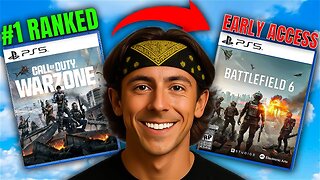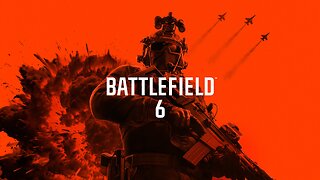Premium Only Content

Episode 2971: House of David: A Rewriting of the Sacred Truth
Welcome to where we examine contemporary media through the lens of traditional Catholic teaching. In today's episode, we delve into the new Prime Video series, "House of David," exploring its portrayal of biblical events and characters, and assessing its fidelity to Sacred Scripture.
Introductory Prayer:
In the name of the Father, and of the Son, and of the Holy Spirit. Amen.
Heavenly Father, we come before You today with hearts open to Your divine wisdom. We ask that You guide our minds as we discuss the sacred stories of Scripture, that we may always seek truth, justice, and integrity in our understanding of Your Word. Protect us from error and help us to stay rooted in the teachings of the Church. May our words reflect Your will, and may all media created about Your holy Word bring honor and glory to You alone.
We ask this through Christ, our Lord. Amen.
Overview of "House of David"
"House of David" is a biblical drama series that chronicles the life of King David, from his humble beginnings as a shepherd to his rise as the king of Israel. The series aims to provide a fresh perspective on David's story, blending historical events with dramatic storytelling. But does it or does it rewrite scripture and if so, why?
Positive Aspects
1. Production Quality: The series boasts high production values, with impressive cinematography and set designs that bring ancient Israel to life. The attention to detail in costumes and settings enhances the viewing experience.
2. Performances: Michael Iskander as David and Stephen Lang as the prophet Samuel. Their portrayals add depth to these historical figures.
Concerns from a Traditional Catholic Perspective
While the series has its strengths, several aspects may raise concerns for viewers seeking adherence to biblical accuracy and traditional Catholic values:
1. Artistic Liberties with Scripture: The series introduces elements and character developments not found in the biblical narrative. For instance, David is depicted as an illegitimate child and is shown to be indirectly responsible for his mother's death. These additions, while intended to add dramatic depth, deviate from the traditional understanding of David's lineage and family dynamics.
2. Character Portrayals: Some characters are given modern sensibilities that may not align with their historical and biblical counterparts. This approach can lead to anachronistic interpretations that conflict with traditional teachings.
3. Dialogue and Tone: The dialogue occasionally adopts a contemporary tone, which can detract from the historical authenticity of the series. Maintaining language that reflects the time period is crucial for preserving the sacredness of the narrative.
The Importance of Fidelity to Scripture
For Catholics, the stories of the Bible are not merely historical accounts but are imbued with spiritual significance and divine revelation. Altering these narratives to fit modern storytelling techniques can dilute their theological depth and mislead viewers about essential aspects of the faith.
"House of David" offers a visually engaging retelling of King David's story, with notable performances and production quality. However, traditional Catholic viewers should approach the series with discernment, aware of its deviations from the biblical text. While artistic interpretations can provide fresh insights, they should not compromise the integrity of Sacred Scripture. As always, we encourage our listeners to engage with such media critically, grounding their understanding in the rich tradition and teachings of the Church.
"House of David" This new biblical epic series on Prime Video retells the story of King David, focusing on the period leading up to his legendary duel with Goliath. The series aims to give biblical characters depth and human personalities.
David was not a bastard son of Jesse. The Bible presents David as the legitimate son of Jesse, a direct descendant of Judah. In 1 Samuel 16:1-13, when the prophet Samuel is sent to anoint the next king of Israel, he goes to Jesse of Bethlehem and meets his sons, ultimately anointing David.
However, some rabbinic and later Jewish traditions speculate that David may have been viewed as an outcast within his own family, possibly due to circumstances not explicitly mentioned in the Bible. Some interpretations of Psalm 51:5 (“Behold, I was shapen in iniquity; and in sin did my mother conceive me.”) have led to speculation that David may have been born under questionable circumstances. But this is not explicitly stated in the biblical text itself.
From a traditional Catholic perspective, David is seen as the legitimate son of Jesse, chosen by God, and prefiguring Christ as the true Shepherd-King of Israel.
No, the Bible does not mention David’s mother being killed by a lion. In fact, Scripture does not provide her name or any details about her life or death.
Some Jewish traditions speculate about her identity and role, but there is no biblical or historical evidence to suggest she was killed by a lion. The Bible does, however, mention that David himself fought lions while protecting his father’s sheep (1 Samuel 17:34-36), but this is unrelated to his mother.
The Bible does not say that Jesse assigned David to care for the sheep because of defiance or disobedience. Rather, it was common for the youngest son in a family to take on the role of a shepherd. In 1 Samuel 16:11, when the prophet Samuel came to anoint the next king, David was out tending the sheep, suggesting it was simply his regular duty as the youngest son.
However, some later Jewish traditions speculate that David may have been treated as an outsider in his own family, possibly due to questions about his birth or because he was different from his brothers. But the Bible itself does not support the idea that Jesse assigned David to care for the sheep as a punishment for defiance. Instead, David’s time as a shepherd prepared him for his future role as a warrior and king, teaching him courage, patience, and reliance on God (1 Samuel 17:34-37).
There is no biblical record of King Saul’s wife consulting sorcerers to help him. However, King Saul himself famously sought out a sorceress the Witch of Endor in 1 Samuel 28 when he was desperate for guidance before his final battle.
Saul had previously expelled all sorcerers and mediums from Israel, in accordance with God's law (Deuteronomy 18:10-12). But when he saw that God was no longer answering him through prophets or dreams, he disguised himself and visited the Witch of Endor, asking her to summon the spirit of the prophet Samuel. The spirit of Samuel appeared and rebuked Saul, foretelling his impending death.
There is no mention of Saul’s wife playing any role in this event or seeking sorcerers on his behalf.
King Saul did not try to have Samuel killed. While Saul became increasingly hostile toward David and even attempted to kill his own son, Jonathan, out of rage (1 Samuel 20:30-33), there is no biblical record of him attempting to kill the prophet Samuel.
However, their relationship did become strained. After Saul disobeyed God's command regarding the Amalekites (1 Samuel 15), Samuel rebuked him and declared that God had rejected him as king. From that point forward, Samuel distanced himself from Saul and mourned over his downfall (1 Samuel 15:34-35).
The Bible does not explicitly mention whether David's mother, Jesse's wife, taught him to play the harp. However, it is clear from the biblical account that David was a skilled musician and played the harp to soothe King Saul's troubled spirit (1 Samuel 16:23). The Bible states that David was "a man of skillful and beautiful music," and it is implied that his musical talents were well-known in Israel.
According to the biblical timeline, David was anointed as king by the prophet Samuel after God had rejected King Saul. The specific events unfold as follows:
1. Saul's Rejection by God: Saul was rejected by God after he disobeyed God's command to completely destroy the Amalekites and all their possessions (1 Samuel 15). In response, God told Samuel that He had rejected Saul as king. Samuel delivered God's message to Saul, and Saul's reign began to unravel. This is when God's curse or rejection of Saul occurred.
2. David's Anointing: Samuel then went to Bethlehem to anoint David as the future king. This event is described in 1 Samuel 16, where Samuel is sent by God to anoint David, who was the youngest son of Jesse, as Saul’s replacement. David was around 15 to 17 years old at the time of his anointing.
The gap between Saul’s rejection and David’s anointing is generally believed to be around 10 to 15 years. Saul continued to reign for several years after being rejected by God, but the anointing of David marked the beginning of the transfer of God's favor from Saul to David. David's reign as king officially began after Saul's death, following a period of turmoil and David’s rise to leadership.
David was anointed as king by Samuel in 1 Samuel 16, and the event where he slays Goliath is recorded in 1 Samuel 17.
The Bible does not provide a specific number of years between David’s anointing and his victory over Goliath, but it is generally believed to be a relatively short period perhaps a year or two. David was still a young man when he was anointed (likely between 15-17 years old), and by the time he fought Goliath, he was probably in his late teens, possibly around 17-20 years old.
There is no mention in the Bible of the king of the Philistines going to the Valley of Giants to search for Goliath. The story of Goliath and his confrontation with David is primarily found in 1 Samuel 17, and it centers around Goliath, the giant from Gath, challenging the Israelite army.
The battle between David and goliath takes place in the Valley of Elah, which is between the Philistine and Israelite armies.
Goliath is traditionally understood to be connected to the ancient giants mentioned in the Bible. He is described in 1 Samuel 17 as a giant from Gath, one of the Philistine cities. His immense size is highlighted, with the Bible stating that he stood "six cubits and a span" (approximately 9 feet 9 inches, though some ancient manuscripts give slightly different measurements). This description has led many to believe that Goliath was part of a race of giants, often referred to as the Nephilim or the Rephaim in the Old Testament.
There are several references to giants in the Bible that are associated with the ancient world:
1. The Nephilim: In Genesis 6:4, there is mention of the Nephilim, who were the offspring of the "sons of God" and the "daughters of men." The Nephilim are sometimes interpreted as giants or mighty beings, though their exact identity and nature are debated.
2. The Rephaim: The Rephaim are another group often associated with giants. They were a race of people mentioned in several Old Testament books (e.g., Deuteronomy 2:10-11, Joshua 12:4). Goliath is sometimes considered to be a descendant of the Rephaim, as the Philistine city of Gath was known for having giants, and Goliath is said to have had several relatives who were also giants (e.g., 2 Samuel 21:16-22 mentions other giants from Gath).
3. Other Giants in the Bible: Goliath’s story in 1 Samuel 17 fits into a broader biblical tradition of giants. For example, the Anakim (mentioned in Numbers 13:33) were another group of giants, whom the Israelites encountered during their journey to the Promised Land.
So, while the Bible does not specifically call Goliath one of the Nephilim, his enormous size and connection to Gath (a place associated with giants) strongly suggest that he was part of the ancient giants' lineage. His defeat by David, a young and seemingly unqualified shepherd, is portrayed as a miraculous act, emphasizing God's power over such mighty beings.
It’s important to note that Samuel was highly respected as a prophet and leader, even if some of his decisions or actions were hard to understand. In ancient Israel, prophets were often seen as messengers of God, even when their messages were uncomfortable or difficult. In 1 Samuel 3:19, it’s stated that "none of Samuel's words fell to the ground," indicating the accuracy and divine authority of his prophecies.
Abner was a key military commander under King Saul and played an important role in Israel’s leadership both during and after Saul’s reign. Here are the key aspects of Abner’s life and role in biblical history:
1. Abner as Saul’s Military Leader
• Abner was Saul’s cousin and served as the commander of his army (1 Samuel 14:50).
• He was a loyal servant to Saul and led Israel’s military campaigns.
• Abner was present at key moments in Saul’s reign, including the pursuit of David, whom Saul saw as a threat to his throne (1 Samuel 26:5).
2. Abner and David
• When David spared Saul’s life in the wilderness of Ziph, he rebuked Abner for failing to protect the king properly (1 Samuel 26:14-16).
• Despite his loyalty to Saul, Abner later recognized David’s legitimacy as king.
3. Abner’s Role After Saul’s Death
• After Saul and his sons died in battle against the Philistines (1 Samuel 31), Abner took Saul’s son Ishbosheth and made him king over Israel (2 Samuel 2:8-10).
• However, Ishbosheth was a weak ruler, and Abner held much of the real power.
4. Conflict with David and Defection
• A civil war broke out between the forces of David and those loyal to Ishbosheth.
• During this conflict, Abner killed Asahel, the brother of Joab (David’s military commander), which later led to his downfall (2 Samuel 2:18-23).
• After a dispute with Ishbosheth, Abner switched sides and pledged allegiance to David, recognizing that God had chosen him to rule all of Israel (2 Samuel 3:6-12).
5. Abner’s Assassination
• David welcomed Abner and agreed to work with him, but Joab, seeking revenge for Asahel’s death, murdered Abner in Hebron (2 Samuel 3:27).
• David mourned Abner’s death and publicly distanced himself from the murder, cursing Joab’s family for the act (2 Samuel 3:28-39).
Abner was a skilled and powerful military leader, but his shifting loyalties led to his downfall. His death weakened Ishbosheth’s rule, paving the way for David to unite Israel under his kingship.
After Samuel anointed David in 1 Samuel 16, he continued his role as a prophet and judge of Israel, but his public influence began to wane as Saul’s reign continued. Here’s what happened to Samuel after David’s anointing:
1. Samuel Returns to Ramah (1 Samuel 16:13)
• After anointing David, Samuel returned to his home in Ramah and did not play an active role in David’s early rise.
• The Spirit of the Lord came upon David, while the Spirit departed from Saul, leading to Saul's increasing instability.
2. Samuel's Final Meeting with Saul (1 Samuel 19:18-24)
• As Saul became more jealous of David, David fled to Samuel in Ramah for protection.
• Samuel took David to Naioth, where he was leading a group of prophets.
• Saul sent men to capture David, but God’s Spirit caused them to prophesy instead. When Saul himself came, he too began prophesying, showing that God's power overruled his plans.
3. Samuel’s Death (1 Samuel 25:1)
• Samuel eventually died in Ramah, and all of Israel mourned him.
• He was buried at his home, marking the end of an era of judges and prophets who had led Israel before the kings.
4. Samuel Appears After Death (1 Samuel 28:3-20)
• Near the end of Saul’s life, he consulted a medium in Endor because God was no longer answering him.
• The medium, to her shock, actually brought forth Samuel’s spirit, who rebuked Saul and told him that he and his sons would die the next day in battle.
• This was the final recorded appearance of Samuel in the Bible.
After anointing David, Samuel largely withdrew from public life, only intervening when necessary. He remained faithful to God, and his legacy as one of Israel’s greatest prophets and judges was honored even after his death.
Here's a summary of some noted deviations:
1. Character Development and Added Narratives:
o The series introduces new characters and subplots not present in the Bible, aiming to enhance dramatic appeal. For instance, certain interactions and backstories are expanded or created to provide depth, which may not align with traditional accounts.
2. Depiction of Events:
o Some events are portrayed differently from the biblical narrative. For example, the timing and circumstances of David's anointing and his battle with Goliath have been adjusted for dramatic effect.
3. Cultural and Historical Context:
o The series incorporates modern dialogue and behaviors that might not accurately reflect the historical and cultural context of ancient Israel. This creative choice can lead to anachronisms that deviate from the period's authenticity.
4. Visual Representations:
o Certain visual elements, such as costumes and settings, have been modernized or altered, potentially misrepresenting the era's authenticity.
5. Theological Interpretations:
o The series presents interpretations of divine interventions and prophetic messages that differ from traditional biblical exegesis, leading to potential theological inaccuracies.
They say it's essential to approach "House of David" as a dramatized adaptation rather than a strict retelling of biblical events. While it offers an engaging narrative, viewers seeking a precise representation of the Bible's account should be aware of these creative liberties.
Net net just like the Chosen and the Movie on Mary don’t waste your time. The creative liberties is just code for rewriting history to provide modern sensibilities and quite possibly rewrite scripture. As Catholic we are trained to never change the word of God and scriptures are not a man made book but a book of God. So don’t waste your time with this movie and instead during lent read the true story by reading scripture and follow the Churches guidance.
Conclusory Prayer:
In the name of the Father, and of the Son, and of the Holy Spirit. Amen.
Almighty God, we thank You for the gift of Your holy Scriptures, which guide us in truth and light. We pray that You grant us the wisdom to discern the authenticity of all that we encounter in the world, especially in media that seeks to portray Your Word. May we always hold fast to the teachings of the Church and honor Your holy revelations.
Grant us the grace to remain faithful to Your Word, and may our hearts and minds be ever open to Your divine truth. Bless all who listen to this podcast, and may we all grow closer to You in faith and understanding.
We ask this through Christ, our Lord. Amen.
-
 11:08
11:08
It’s the Final Round
14 hours ago $1.32 earned💰NFL Week 6 Best Bets🔥Player Prop Picks, Parlays, Predictions FREE Today October 12th
5.98K3 -
 LIVE
LIVE
Reidboyy
23 hours agoCamo King Grinds 100% Completion for Battlefield 6 *SECRET* Mastery Camo (All Badges + Camos 100%)
81 watching -
 LIVE
LIVE
DynastyXL
2 hours ago👻 DYNASTYXL Presents: “What’s Your Favourite Scary POI?”
18 watching -
 29:03
29:03
itsSeanDaniel
2 days agoIllegal Migrants REVEAL How They're INVADING Europe 🇪🇺
21.9K21 -
 LIVE
LIVE
BBQPenguin_
3 hours agoIs Battlefield 6 worth Buying?
22 watching -
 8:08
8:08
MattMorseTV
18 hours ago $14.55 earnedThe USA - China TRADE WAR just went NUCLEAR.
28.5K64 -
 LIVE
LIVE
Seasickdruid
1 hour agoBattlefield 6 - Drops Enabled Over On Twitch - Watch the Druids Play
30 watching -
 LIVE
LIVE
Midnight In The Mountains™
50 minutes agoMorning Coffee w/ Midnight & The Early Birds of Rumble | Teachers send 3 million map w/ no Israel?
52 watching -
 20:22
20:22
Real Estate
8 days ago $8.77 earnedNumber 1 Indicator Home Prices ARE ABOUT TO CRASH
22.5K9 -
 30:09
30:09
Afshin Rattansi's Going Underground
20 hours ago‘Gaza Will Haunt Israel for Generations’- Mika Almog Granddaughter of Former President Shimon Peres
18.9K11